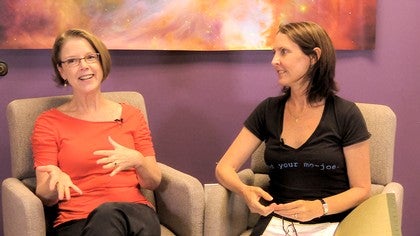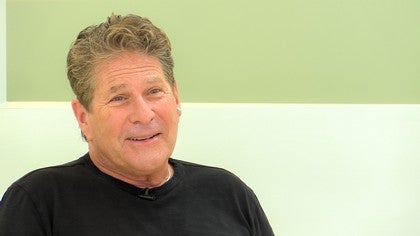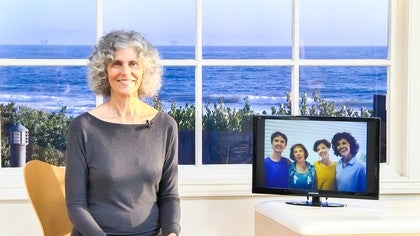Discussion #1746
Amy and Rachel on Romana
Description
About This Video
Transcript
Read Full Transcript
Introduction
My name is Rachel Taylor Seagull and I was a student of Romana Chris, enough Skus in New York for three years. I own with my sister, um, the Pilati center from 1990 until today we co founded it and code owned it. I've taught PyLadies ever since. And My name is Amy Taylor alpers and um, yeah, since 1990, um, we've owned the Palati center here and I too was a student over Mana [inaudible] Moscow's back in the mid eighties. What led me to [inaudible] was that I was a ballet dancer since I was little andChapter 1
Finding Romana and Becoming Teachers
I got dance magazine faithfully when I was, you know, when I was old enough to read.
And at one point there was a series of polarities articles was called Corolla tree or shares. And so I knew about politeness but I, but only through this article. And so it was in the back of my head and I went on through my life and danced and taught ballet and moved out to Colorado and taught ballet was in companies and et cetera. And all the while this word and this concept of [inaudible] was in the back of my head. And then dance magazine put out another section of articles by Ramana and it was just like, it was just enough to send me to send me over to the idea that I could go and study with Vermont.
I could go and learn Polonius finally at the age of whatever I was 30 something 34. And um, and so I left everything in Colorado cause I had lived here since 73 I left everything and I went to New York. Um, I lived with Amy and we studied [inaudible] with Romana together. Yes, yes. Now I'm trying to remember actually what led me to [inaudible] my first memory, uh, other than Rachel, right. My first memory of connecting with [inaudible], but after the fact was in 1975 I lived in New York for two months to just study dance. And I had, my very, very dearest friend was with dance theater of Harlem and we were all staying in this particular boarding house in New York down on West West 34th street. And all of the dance theater of Harlem dancers were staying there. So through my friend Stephanie, I got to meet a bunch of them and they would come back and talk about this crazy lady who made them do these crazy exercises and they would show us stuff. And you know, I don't even know if they called it [inaudible] and I don't think, it wasn't until later that I realized, oh, they were talking about Kathy grant.
And then I had a couple other kind of connections that would have brought me to Cathy first actually like people that I knew who I'd become students of hers. Um, and this would have been in the early eighties and I got up the nerve one day because I was having terrible problems with Shin splints and I just didn't know what to do. So I had gotten number and I called her up,
So she actually had an experience in the previous studio and then by the time I joined her Romana and the whole company had moved to that kind of next location, which was the sort of temporary place was where we were most of the time, which was on, we're trying to remember like east 53rd street or some, they're like Lexington and something like that. So that's where I started. So what motivated us to become plotters teachers was a very odd situation. We were just students. We were just doing pilates for our own health. We loved it. We really, really were not thinking of becoming teachers at all. We both were teachers of movement. We'd been teachers, but this was more for us.
But we went to the studio one day and I always remember it as April fool's day, 1989 and this is that same studio on, in the East fifties and it wasn't there. It was gone. Closed overnight. Yeah. So I went back down to the doorman, I said, Mike, what was going on? They said, oh they moved out. So we over the weekend, I was like, what? So I, I get down onto the street and I found a pay phone and I called Rachel. Oh my God, they, they, they've closed, they're gone. You know, and we, cause we were addicted by this point. We were like, no, that can't happen. But it was such a small little world that you didn't realize, oh maybe there was some other place you could go. It was just that you went to a monitor or there was nothing else. Yeah. So, and I always laugh cause I just, and then I went and had like a little shopping therapy after that. Um, but then we went back to the dance collection.
We looked up Vermont as name and how you would spell it and we found her in the phone book and we called her and she said, oh honey, we're gonna reopen. And that was when they reopened in Dragos and also in this other location from our little body arts, I think it was called. And it was in the east sixties up near Bloomingdale's. But that was the moment we were like, oh my God could disappear. Yeah, this thing looks a little fly by night. We bet our learn how to teach it because we knew by that point we were probably leaving New York and hopefully moving to boulder or Rachel had lived here for many years and then I would come and visit all the time and my husband and I, and we always said when we were ready to leave New York, we're moving to boulder. But at that time, of course Rachel had moved to New York, but we were hoping to move back to boulder and we were on a contract at the, at the dance collection, at the Library Museum for Performing Arts that was coming up.
She was getting married, we were kind of finishing our New York stint and it was like, oh my God, this was April and we only had a couple months left. So we then cornered, we tie like the next day and said, hey, the next day we could find him, which was when they reopened and said, we want to teach or train, we want to learn everything we can learn from Romana before we leave. Yeah. So they basically put together this two week long teacher training program, 500 bucks a piece. And basically there was nothing about it other than we had access to Romano, like full time. We had to do something at NYU.
We did do huddles thing down at NYU or something. Yeah. So I mean truly, you know, Romana worked from seven to two or something. So we just spent those hours with her and she was accessible and we could ask her as many questions as we wanted. Um, but that, that's all it was. And then we got, we had to track them down and get them to give us a certificate that they, we tie and Romana signed. So I mean we were sort of like, oh my God, we better, it just happened. We have to learn how to teach this thing because it could disappear tomorrow and we can't have that, you know?
So we even still weren't necessarily intending to teach. Even once we came to boulder we weren't sure because they didn't know where to get equipment and that's what kind of led us. Amy and I were sitting on Amy's porch one summer, the early summer of 90 going. Um, I had been an assistant. Yeah, yeah, yeah. Huh. And I had been an assistant Montessori teacher cause I didn't want to teach ballet anymore. Amy was teaching ballet at cu and doing some rec centers here at the REC center.
And it was kind of like, what do you wanna do with your life? I don't know. What do you want to do? And Amy said, you were really very much at a crossroads kind of freed up. We'd moved here. We didn't necessarily have to continue with our lives the same way as we had. And I said, well, I don't know. I think I want to open a Pilati studio. And Rachel was like, oh, whoa, okay, I'll, I'll help you.
But we literally didn't know how to get equipment and that, that was the hardest part. And so there, you know, there's big kind of long story about getting equipment. And then finally meeting Steve Giordano through Romana and he enabling us to get equipment and open our studio and start our training program.
Chapter 2
First Impressions
My first impressions of Romana were of going into this old rickety building and entering this studio that I, uh, that was very unusual to me. All the equipment was something I'd never seen before because in the magazine articles I had read, they really didn't use equipment. They talked about, um, the mat work and things you could do as a dancer. So I walked in, it was all very foreign, very ancient.
And Ramana with like a queen,
I know it's interesting cause I think back now and I think, oh yeah, it was, you know, as a ballet dancer, obviously it made total sense, but I do actually remember thinking, oh my God, this is such unusual movement and with hard, it was very hard. It was extremely confronting. Um, you know, I couldn't just be good at it cause I really didn't understand. But, um, Romana was she, she, she wafted about, you know, and she didn't necessarily ever zero in on me. I didn't feel in those early days, but she would be often teaching other people or she had her clientele as well, sort of her older group of people that have been coming to her that she really did focus on. Um, you know, she would have her other teachers work with those people as well, but you could, she was kind of, you know, a little bit held captive by some of her more regular clients. But um, she was aware you were there. You, you never thought you were hiding or could hide. You know, she definitely had eagle eyes and she would cross the room, headdress down, straighten your knee. No, this, she was talking to, you know, what was it she would say with your hips? No. Pokies yeah. And she had a little thing in the running where you weren't supposed to ever do this with your hips. Yeah. You know, and like she'd catch you on all of that kind of stuff. But, but mostly I remember just feeling really comfortable because she felt like such a familiar person to me. I think there was a little bit too, I mean, it turns out that she was exactly the same age as our mother, like literally born in June of 1923 and so I think I also resonated with her age. Like she felt like mom a little bedsheet they weren't alike really, but, but not really, but you know, but like she was that age.
I don't know that she inspired me as a practitioner of PyLadies or now if I got that far until I decided I was following her around to glean every pearl that she dropped. Yeah. I would say that my inspiration maybe has, there's kind of like three different eras in a way. There was the era of the late eighties when we were just students as clients with no intention of becoming teachers. We really were just clients. And that's really all we were to her or to any of the other teachers. They didn't look at us as like, you know, raw material for that next phase. Um, and so I, I don't think that, I know how she inspired me during that phase other than I know I asked almost a tremendous amount because in looking back and thinking about her or, or teaching, trying to pull forth what are the Ramana Isms, I realize like I teach like Romana, you know, that it just came through and I, I didn't mean to, it just did, you know, so I, I say things, she said, I partner the way she did. I, you know, there was a way that she had of inspiring people through joking and picking on you, but always with a joke. She was, I never found her ever mean. I know she could be, but she really wasn't.
She was always a character and she was always teasing and she would tease you to do something bigger, stronger, faster, harder. Put Your, put your something into it. She would say, yeah, like meaning like why are you wasting time? Yes. Put everything you've got into that. She was such an amazing cheerleader. You didn't realize she was doing it, but you got completely consumed by her energy and she goes, just carry you on. And literally that is exactly how we teach. And it wasn't until later that we recognize like, oh my God, I teach like her. You can't tell because that's who was your teacher, you know? But I do think there was just the Osmosis unbeknownst to ourselves.
And then there was, oh my gosh, let's learn from her in this really short piece of time that we had before we left New York. And then there was this, that third phase where she came to boulder two or three or four times to help us with our training program at the beginning. And that was when we really got to like have her in our hold, you know, and take her out to dinner and pull as much information out of her as we could and really spend a lot more time with her. So we had a different period at that point with her and she was so excited, so happy, so grateful, so appreciative. So like she didn't think of herself as a star. She was, and I was going to say when I first met her, she was just another ballet teacher, another movement teacher. She was into star.
We didn't know that she was a really special person on any level. She was just the woman who ran this studio, just like if you went to that ballet studio, that was the woman you take your classes from. So you didn't have a sense like, oh my gosh, we have to go like this. And she never demanded that. Um, she kinda just owned it nationally cause she did walk around like a queen and you automatically revered her. But she loved Plautus with her heart and her soul and every cell, and she wanted you to love Peloton. And that's how she taught from this incredible and bodied passion for passing this word, this work on from Uncle Joe. I mean she felt like she inherited not only the, the wonder of it, but the responsibility of it.
She felt that she was the one to carry it on and we always felt very strongly that the reason she was the one was because she was a ballet dancer. She was not a choreographer. She was not somebody trying to create something under the Romana name. She really had the reverence for Joe Plots that we had for our ballet teachers. It didn't occur to her to change the form. If a ballet dancer, you start with A's and this is how class goes, and so she wasn't really about that at all, so she was just, this is what uncle Joe told me, and she'd never doubted it if she changed anything.
She certainly never realized it or admitted on any level. She felt that she was continuing on saying exactly what he said and that that was her God given her some kind of given heavenly given gift and responsibility, you know, so she felt very strongly and during the phases that we knew her from the mid eighties to the early to mid nineties she, nothing bad had happened yet. It was all good and it, and it was all lovely and she was still happy and she still loved teaching. And it didn't matter if it was this 80 year old woman or this brand new B, you know, perfect little body from, from New York City Ballet. She didn't care. She didn't really separate. She did love the guys though. So yeah. So if a guy came in the studio thing right at her, right at him, but all the same, you know, there there was, it was just her life.
This is what she did with her life. This is her lifestyle was her life joy and her life's job. You know? And it wasn't until after the trademark litigation and the whole changing of the guard ownership from highlight over to Sean Gallagher that you started to see her [inaudible].
Chapter 3
Trademark Lawsuit
to the best of her ability to her best of her conscientiousness and conscience Joe and Clara's work.
She truly felt that everything she did had been talked to her by them and that she was almost like a mouthpiece for them. She stood for classical, which wasn't even a term yet. Glottis and you know, she was, she would say, you know, if you want to take this work and go on with it, do it. Just call it something else. Call it by your name. This is [inaudible]. And that was always her. If she ever had any agreement, that was it.
You know, like holidays is this, Joe made it. Anything other than this is not paralyzed. It could be police based or it could be the gentry work, but it's not Polonius. And I think her standing strong and steady for all these years about that was probably, well I was, it's not her greatest thing because the greatest thing is that she kept teaching all those years and she touched so many people with the importance of the work. So that was probably her greatest contribution.
I think one of the key things about Ramana was that she was Joe,
And she stayed until Clara died. And then she just stayed on, you know, so it was, she was family and she, she, she owned it not as if she was family. She understood, I think that there was some kind of distinction, but because there wasn't any other families, she did feel like, you know, he, he was my uncle or he, I was related to him and I, I got it. Not through the genes, but as if the trademark trial affected Ramana like I don't think we could ever get to Naaman Lane. It was, it had to have been a nightmare for her. I think it started out okay. She was used to the situation of kind of handing over some of her power to some guy that she found who would own this business or run this business so she could teach. So when we met her, we, ty home owned it and then Steve Giordano came into the picture and I think she had very high hopes for him. And he was the one who helped us start our training program with her. And he was the one who brought Sean into the industry and helped Sean and Romana start the training program as well.
So our programs really came from those same seeds of Romana and Steve. Shawn was over here and we were over here and at some point, you know, there started to be some, an animosity between Steve and Sean and Romana had to pick and for whatever reason she picked Shawn and I don't think it was ever the same. I think she felt pretty good about it at the beginning cause I think he did take good care of her for quite some time. But he had a mission, which wasn't, I don't think necessarily a bad one, but not necessarily something that fit her personality, which was, he began to then start these teacher training programs all over the place. And then she would have to fly in and certify people. Like she would be dropped down in Seattle and she'd have these 25 people she'd never met. And she was supposed to say, okay, I say you're qualified.
And that was when you started to see her kind of tighten up and say, well, we're not doing that anymore. That Dah, Dah, Dah, Dah and this would change and this would change and this would change. And, and other things we get really rigid and hardcore and we'd be like, Whoa, really? She says that now. Cause that's not how she used to say it. Um, and, and the, and then as it got closer to trial and then the trial itself, I think that that was almost like a death blow for her. I think she recovered again. But honestly, I think it was the beginning of the end. And, and I know that, that, that the break with Cathy over the trademark was heart breaking. And so it was, it was wonderful to know that they were able to reconnect before Kathy died. But I, you could just watch this thing happen. And we, we saw Vermont Vermonter several times post 1993 which was when Shawn said she could no longer come to boulder. So once Shawn got his gut control of the situation and then he started saying, okay, you can't unite, you guys are not affiliated without us anymore, so Ramana can't come anymore.
So that was when we kind of stopped seeing her officially. But we went to New York a couple of times and saw her a couple of times afterwards. And you, she was always lovely to us. She was always very sweet. Um, but you, you, you felt it coming through the industry almost more than directly from her. But you know, she was getting older too, so, so I was gonna say she was getting older and I think Sean probably represented for her the possibility of not having to earn her living by the hour. You know, up until that time, she literally earned her living hour by hour.
If she didn't teach, she didn't make any money, you know, and here she was in her late sixties, early seventies, still earning her living by the hour. And I'm sure Sean could say to her, look, we're gonna make this big organization. You will have a salary. You won't have to teach. You'll be mean. That's what we always assumed. And, and I, I, I think that it sounded like a great idea to her, to him, we thought it was a great idea because we really did want the classical entity of the plotting method to maintain its integrity. And that was theoretically the intention. You know, it didn't really go that direction and it was sad to watch. But um, I think Ramana felt like, oh, he is going to be able to help me do this final thing for uncle Joe, which is to, you know, set it off into the future quite beautifully quality. Yeah. But that isn't really what happened and I think, you know, what we could see occur and then later in some of the DVDs and things that came out around, I'm not even sure, early two thousands, 2005 something like that you could at this point now you basically saw it with sort of a caricature of Romana.
She had like co she had like, what's it called? Reduced like when you make gravy or something. It was like a condensed version of her. Like it was just the Shtick by that point. You know, and, and the people who were doing the work in the films, you were like, oh, they're just doing the shtick. You know, there, there wasn't, there wasn't the depth. There wasn't the honesty anymore, didn't feel like it or are the passion. It looked like a bunch of exercises and then beautifully, it was like, let's rock star this stuff. Let's show you how hard it is. Let's make it harder.
And I was like, that was never, ever part of the intention. There was not a race to get to the advanced work. There was no showing off. There wasn't anything like that. And pretty soon that's all there was. It kind of felt like, oh, I see you're just doing the show off stuff now. So some of the things that reminded that she said about the reformer three
Chapter 4
Romana's Sayings
former, they're like, braces on your teeth. They're there to reform you, to make you straight and even, and whatever braces, whatever she thought braces we're going to do.
That was what the reformer was going to. And she was always, always incredibly clear. It is not a machine. Don't call it a machine. [inaudible] yeah, it was an apparatus. But what she meant was you moved it, it didn't have an on off switch. You didn't ride it, you didn't get on and have it do stuff to you. You got on and then you moved it. Right. And that, you know, like it took us years to go and really get that. Oh, I can't. Oh.
Cause she was so adamant about that and it was like not sure what that means. Okay. Well later we will. Yeah. Later we read in journalistic articles, Joe being quoted saying he built a machine as extra muscles, not only for himself as the teachers, they didn't have to work so hard, but for the clients so that they could get things that mat work they couldn't get yet. So all the springs and the straps and everything with the aid you in achieving this product because you couldn't get it without the machine, without the apparatus. The apparatus. Yes. So that was a big one. She did. She had a bunch.
He had no hanging baskets like your uni to get your butter. Yeah. And she would say, pinch your bottom a lot. Um, and she would say one piece of steel from your head to your heel and long stretches like that. She wouldn't say one piece of steel from your head here. She'd be like one piece of steel from your head, your heel. You know, and that's when I realized like, Oh my God, we all do that. Yeah, we do. I just say I can't today it without saying it like that. And Ramana just always said it like that. Um, the hug, hug your ribs in Rambox sh in short box round.
Well, not here. He never placed and there was no positions. You were moving there. You did a strong movement. She always talked about the box. Right. And she didn't mean, you know, some people think of that as kind of negative flow. You're supposed to keep this very square.
She just meant you needed to always have an awareness that you had these parts of your body and that, that they were in relationship to one another, you know? And that also be a wild apparatus. Yeah. And that the apparatus helped you find that she would do that drawing, which I loved, where she would just put a piece of paper on the floor and put your foot on the floor and then trace your foot and then she would put a dot on your big metatarsal, your little metatarsal in this heel and the draw triangle. That's your foot.
You would take your two hands and pull your toes down to your crat, towards your crown as you were picking your neck, your spine, up to bring your forehead to the, or your crown to your shin. This is called picking the cherries because it was so awful. I guess she had to give it a nice name. She'd definitely give you candy. Like she would say, this is the candy, you can do a little massage. I think that that perhaps came more from Corolla because it wasn't until later that we discovered that Romana had taught in Karola studio for a long time. And that's how she knew Cathy, I think. Right. So, um, yeah, so I think that, um, we never could determine w you know, which were the ones that came just from her or from someone else or from Joe.
My fondest memory or one of my fondest memories are, this one just stands right out. She came to boulder several times to help with our teacher training program. And one time somebody did something in the workshop that set her off and she went on at least a half hour perhaps performance showing you every goofy thing that people have ever done in PyLadies, how bad it could look, how sloppy it could look banging the equipment, straddling the equipment mega. No, no, no. Um, and it was terrible. It was hysterical. And because, yeah, she was, you know, showing off a little bit for the group, but it was still early enough on that.
It was just adorable. It's so showed her personality shining through a certain part of her personality anyway. And, and it was, it was extremely memorable and lighthearted and a, I don't know, I just really appreciated that one. One of my favorite memories of Romana was when she came to boulder to she, we drove her up to Fort Collins because two of our graduates
And she talked about having these long braids and those black shoes that you had to button up. And on her birthday she was given a pistol that she cared that she would wear because there were alligators and panthers and you know, snakes. And so she, I could, I could just see her like this little Annie Oakley at nine years old, pack a pistol and you know, not afraid to use it. And she just, she, and she thought that was so funny. Cause nowadays of course people's feet were terrible cause they didn't wear those shoes and no, but everyone was like hunched over and people were afraid of their own shadow.
And here she was at nine, you know, with the alligators in the pistol,
Because she said you could do that. You know, I think we would want to give her some champagne in a big huge bouquet of flowers and a giant, giant hug and a huge thank you.
Pilates Legacy Project: Discussions
Comments
You need to be a subscriber to post a comment.
Please Log In or Create an Account to start your free trial.

















